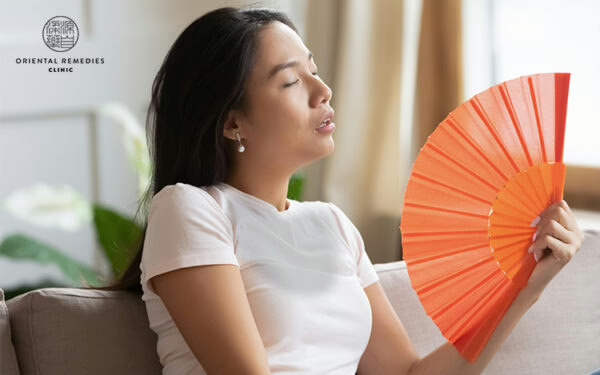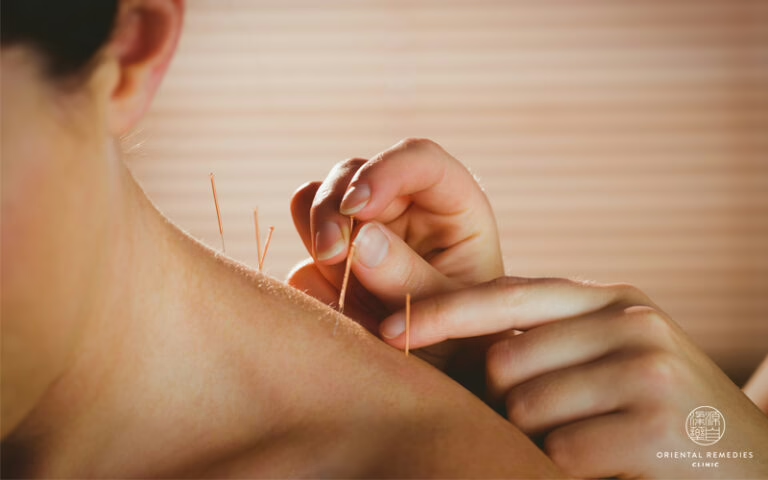Understanding Hot Flashes: Causes, Symptoms, and TCM Treatment

Physician Kerry Chen Hot flashes are one of the most common and often uncomfortable symptoms of menopause, affecting many women as they transition through this stage of life. These sudden waves of intense heat, often accompanied by sweating, can feel overwhelming and sometimes even cause emotional distress. If you are seeking relief, it is important to understand what causes hot flashes and explore the treatment options available. In this article, we will take a closer look at what triggers hot flashes, their symptoms, and how Traditional Chinese Medicine (TCM) can help you manage them naturally. What Causes Hot Flashes? Hot flashes are most commonly linked to hormonal changes, but other factors can also contribute to their occurrence. Understanding these causes can help you find the right treatment for menopause relief. Hormonal Changes During Menopause and Perimenopause The most common cause of hot flashes is hormonal changes[1], especially the drop in oestrogen levels during menopause. As women approach perimenopause and menopause, their bodies go through significant shifts in hormone production. Oestrogen, which plays a key role in regulating body temperature, declines, which can lead to the body struggling to control heat. This often results in hot flashes, which can increase in frequency and intensity before gradually settling down over time Medications Certain medications can also induce hot flashes as a side effect. For example, some individuals on selective oestrogen receptor modulators (SERMs) like tamoxifen and raloxifine tend to experience hot flashes[2]. If you are experiencing hot flashes while on medication, it may be worth talking to your physician about possible alternatives. Medical Conditions Certain medical conditions can make hot flashes worse. For example, hyperthyroidism can cause the thyroid to overproduce hormones, leading to symptoms like excessive sweating, heat intolerance, and hot flashes[3]. How TCM Treatment Can Help If you’re looking for natural remedies for your hot flashes, Traditional Chinese Medicine (TCM) could be the solution. Rather than merely relieving the symptom, TCM addresses the root imbalances in the body, offering a more holistic approach. Here’s how TCM can contribute to the treatment of hot flashes: Herbal Medicine In TCM, herbal therapy is often used to address hormonal imbalances and help regulate body temperature. Herbs such as Chinese Angelica (当归), Szechwan Lovage Rhizome (川芎), Rehmanniae Radix Praeparata (熟地黄), and Chinese Dodder Seed (菟丝子) are commonly used for menopause symptoms and hormonal balance treatment. These herbs work by: Tonifying Yang Strengthening the body’s Qi Replenishing Kidney Yin Regulating the Liver Together, they help restore the body’s internal balance and support overall well-being. Acupuncture Acupuncture is widely used in TCM to manage hot flashes and other symptoms. Fine needles are inserted at specific meridian points to stimulate the flow of Qi (energy) throughout the body. This process aims to help balance internal energy and regulate hormonal fluctuations. In fact, studies suggest that regular sessions of acupuncture for menopause may help reduce the severity and frequency of vasomotor symptoms [4], such as hot flashes and night sweats. Cupping and Gua Sha Both Cupping and Gua Sha are traditional TCM techniques that promote blood circulation and enhance Qi flow. Cupping involves placing suction cups on specific areas of the body, drawing blood to the surface. On the other hand, Gua Sha uses a smooth-edged tool to scrape the skin in long, firm strokes, stimulating microcirculation and lymphatic drainage. These techniques promote blood and Qi circulation, which can aid in the regulation of body temperature and ease symptoms like hot flashes. Ear Acupressure (Ear Seeds) Ear acupressure involves placing tiny seeds on specific acupoints on the ear that correspond to hormone-regulating areas of the body. This method provides continuous, gentle stimulation and may help support hormonal balance naturally over time. Electro-Lymphatic Therapy (ELT) In addition to acupuncture and herbal remedies, ELT is one of the complementary services available at Oriental Remedies Clinic to support TCM treatments for hot flashes. This non-invasive technique uses an FDA-registered machine to stimulate lymphatic drainage. By enhancing lymphatic circulation, ELT supports circulation and helps with detoxification, which in turn can help the body respond more effectively to hormonal changes and reduce hot flashes Cell Pro Therapy (CPT) CPT is a gentle treatment that delivers high concentrations of Negative Ions to the body through plates placed at various points. This process helps support healthy blood circulation and promotes the natural production of serotonin[5], commonly known as the body’s “feel-good” hormone. Through improved circulation and enhanced serotonin levels, CPT may help regulate body temperature, balance mood, and ease stress during hormonal changes Exploring TCM for Women’s Health in Singapore Are you looking for a more natural treatment for hot flashes and other menopausal symptoms like mood swings, sleep disturbances, and night sweats? TCM offers a holistic option that looks beyond just the symptoms. TCM care for menopause focuses on supporting the body’s internal balance, helping you move towards a healthier, more balanced version of yourself during and beyond this important life stage. At Oriental Remedies Clinic, our physicians collaborate closely with you to develop a personalised treatment plan tailored to your needs. Our approach to TCM for women’s health combines time-honoured remedies with modern technology, supporting your body’s natural balance and empowering you to take control of your well-being. Contact us today to find out more. This article is written by Physician Kelly Wong, registered TCM physicians certified by the Traditional Chinese Medicine Practitioners Board (TCMPB). Kelly Wong Physician VIEW QUALIFICATIONS During her internship at Dongfang Hospital, Physician Wong honed her expertise in Traditional Chinese Medicine treatments, including acupuncture, moxibustion, and ear acupressure, under the mentorship of Professor Liu Yan Xia, Chief Physician of the Gynecological Endocrinology (Fertility) Department. Note: all words in Italics mentioned henceforth refer to the TCM organ system and not the anatomical organs/terms referenced in Western medicine. Disclaimer: The content on this page is for information and educational purposes only. Such medical information may relate to disease, injury, drugs, and other treatments, medical devices, and/or health products. Medical information does not amount to advice, and if advice is needed
6 Common Myths About Acupuncture Debunked

Oriental Remedies Clinic There is so much more to Traditional Chinese Medicine (TCM) than meets the eye. The practice is deeply rooted in the belief that good Qi flow keeps an individual’s mental, physical and emotional state balanced, promoting overall health in return. Acupuncture, in particular, is a TCM therapy with approximately 2,000 years of history that has skyrocketed in popularity over the years. This ancient practice is known for its ability to create or restore Qi flow through the body for improved health and even rapid pain relief. Effective for a variety of conditions, acupuncture helps with issues ranging from chronic bodily pains to digestive problems like gastritis, common sleep disorders like insomnia and even emotional woes such as anxiety. Despite being a renowned TCM therapy, there are still myths surrounding acupuncture. If you are feeling apprehensive about going for acupuncture, these myths debunked will hopefully convince you to take a leap of faith – keep reading to find out more. Myth 1: Acupuncture is painful One of the most common misconceptions about acupuncture is that it is painful since it involves the insertion of needles into acupoints of the body. On the contrary, very thin needles are used and you will usually only feel a slight prick and tingling. Most people feel at ease during an acupuncture session once the needle passes through the skin’s pain receptor, so there is no need to worry about any unbearable discomfort. Any soreness and pressure will also be relieved when Qi flow is established, usually shortly after the insertion of the needles. However, in the unlikely event that you experience pain or discomfort, do not hesitate to sound it out to your TCM physician. Learn more: Is Acupuncture Painful? Myth 2: Acupuncture is only effective in treating pain Although acupuncture is most commonly known as a TCM therapy to provide pain relief, it is, in fact, a versatile treatment that has way more benefits than that. Acupuncture can also boost fertility, improve insomnia, alleviate depression and anxiety, and aid in weight loss just to name a few. Speak to your TCM physician to find out if acupuncture is right for you. Myth 3: Acupuncture is accompanied by bad side effects The good news is unlike taking medications and undergoing invasive medical procedures, acupuncture promotes the body’s natural healing ability through enhancing Qi flow, and is generally safe with minimal and short-term side effects. You can expect to feel some soreness or see light bruising but these side effects should resolve on their own within a few hours or days. It is also important that you visit a trained and certified TCM physician in Singapore for acupuncture sessions for greater peace of mind. Myth 4: One session of acupuncture is sufficient While you will see and experience the benefits of acupuncture after just one session, consistency is key for optimum and longer-lasting results. Your TCM physician will be able to advise you on the frequency and duration based on your unique needs and it is advisable to stick to them. Once you have achieved your health goals, you should be able to slowly reduce the number of acupuncture sessions. Myth 5: Acupuncture is the same as dry needling Both acupuncture and dry needling require the insertion of needles but their similarity stops there. They are two different therapies done by different practitioners – acupuncture focuses on stimulating the acupoints on meridians to promote overall health while dry needling focuses on trigger points for muscle release. Go for acupuncture if you are looking for a holistic approach to treating a wide range of conditions. Myth 6: Acupuncture is not backed by science Another common misconception about acupuncture is that it is an ancient folk practice not backed by science. While more research still has to be done, some studies have shown that acupuncture may be helpful for many pain conditions ranging from neck pain to knee pain arising from osteoarthritis. This could be thanks to the effects on the tissues where the needles are inserted. Get acupuncture done in Singapore at Oriental Remedies Group At Oriental Remedies Group, our TCM physicians are trained and have years of experience under their belts in providing acupuncture for patients suffering from a wide range of conditions. Book an appointment today to experience the benefits of acupuncture for yourself! Note: all words in Italics mentioned henceforth refer to the TCM organ system and not the anatomical organs/terms referenced in western medicine. Disclaimer: The information on this page is for information and educational purposes only. Such medical information may relate to disease, injury, drugs and other treatments, medical devices and/or health products. Medical information does not amount to advice, and if advice is needed an appropriate professional help should be sought. The disclaimer asserts that no warranties or representations are given in respect of the medical information, and that the website operator should not be held liable if a user suffers any injury or loss after relying upon the medical information. All wellness assessments and technology-enhanced therapies using wellness device(s) are intended for use only for general well-being purposes or to encourage or maintain a healthy lifestyle, and it is not intended to be used for any medical purposes (such as detection, diagnosis, monitoring, management or treatment of any medical condition or disease). Any health-related information provided by these devices should not be treated as a medical advice. Please consult a physician for any medical advice required. Please consult a physician for any medical advice required. RELATED TOPICS YOU MIGHT ALSO LIKE